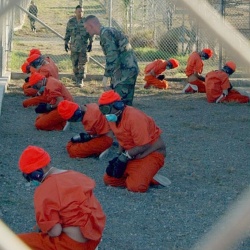Illegal detention
 Men held in US Guantanamo Bay detention camp | |
| Type | criminal |
| Detention without charge, especially when done in secret, is one hallmark of a Police State. It is already admitted to occur in the USA, as part of the "war on terror". | |
Illegal, arbitrary or extrajudicial detention is the long term detention of individuals by a state which has not made any legal charge against them. Short term detention without charge is standard procedure (for example, of a suspect fleeing the scene of a crime) and nation states used to have strict limits on how long such detentions took place before the individual was either formally charged or released. Most if not all legal jurisdictions still do, although increasingly vaguely exceptions are made for reasons of "national security" of the prevention of "terrorism". Detention without charge, especially when done in secret, is one hallmark of a Police State. It contravenes article 9 of the Universal Declaration of Human Rights - "No one shall be subjected to arbitrary arrest, detention or exile."
Contents
Writ of Habeas Corpus
The Magna Carta was a legal document drawn up in England in the 13th century to codify and limit the power of the monarchy, which over the centuries was widely adopted, especially in English speaking countries. Detainees were entitled to call upon the writ of habeas corpus — literally "you should have the body." To be legal, their detention required that the state show some meaningful evidence to demonstrate that there was a legal justification for their detention.
Ongoing rollback
Increasingly since 9-11, nation states are following the lead of US in rescinding (de facto or de jure) the precedent of Habeas Corpus. Using the pretext of "national security" in the face of a generally undefined terrorist threat, more and more countries are rountinely subjecting individuals to arbitrary arrest or detention without any evidence that they have committed a crime.
China
The Chinese government has illegally detained perhaps hundreds of thousands[1] of followers of Falun Gong in its ongoing effort to eradicate the group which it claims "jeopardizes social stability".
US
The United States admits to use of indefinite detention without trial - known under various euphemisms as "internment", "civil commitment", "preventive detention" or "administrative detention", often of the mentally ill or of those alleged to be a danger to national security. Clandestine detention is ongoing, though harder to document at CIA black sites. The Guantanamo Bay detention camp has become a high profile symbol of arbitrary arrest and torture, and so Barack Obama's 2011 signing of the NDAA, which effectively blocks its closure was an important signal of what could be expected from his presidency.
UK
The 2000 Terrorism Act dramatically extended the permitted length that police could detain suspects without charge to 28 days.[2] The Justice and Security Act, passed on the 25 Apr 2013[3] introduced a system of closed material procedures (CMPs) which introduce what Barrister Martin Chamberlain described as a system of justice worthy of Franz Kafka:
"As a special advocate, you are able to see and hear both the ‘open’ and ‘closed’ evidence. But often, the Government witness will refuse to answer particular questions in open court, and the issue will have to be pursued by the special advocate in a closed hearing. But, after seeing the closed material, I am prohibited from speaking to my client. So I will never know if he had an alibi or an innocent explanation and nor will the court".[4]
Switzerland
Mohamed El Ghanem was a refugee in Switzerland, illegally detained in 2007 after, he says, refusing to spy for the intelligence services.
Canada
Canadian Minister's Security Certificates are a means of detaining and deporting foreign nationals from Canada. The government is supposed to have "reasonable grounds" and the process is subject to limited legal review. In 2002, the Supreme Court of Canada upheld this process as constitutional, ruling that the provisions of the security certificate process do not violate Section Seven of the Canadian Charter of Rights and Freedoms. It further specified that the Immigration Act generally does not permit deportation of people to a countries where they will likely be tortured, although it ruled that deportation to such countries was justified in certain (unspecified) "exceptional circumstances".[5]
References
- ↑ Freedom House, The Politburo's Predicament: Confronting the Limitations of Communist Party Repression, January 2015
- ↑ http://www.statutelaw.gov.uk/content.aspx?ActiveTextDocId=1852255
- ↑ http://www.publications.parliament.uk/pa/ld201213/ldhansrd/text/130425-0001.htm#13042554000435
- ↑ http://www.dailymail.co.uk/news/article-2109001/Secret-courts-condemned--lawyers-run-them.html
- ↑ Suresh v. Canada (Minister of Citizenship and Immigration), [2002] 1 S.C.R. 3 at para. 78
- ↑ Basic documents about the treatment of the detainees at Guantánamo and Abu ... quote=Hamdi argues that he is owed a meaningful and timely hearing at that "extrajudicial detention [that] begins and ends with the submission of an affidavit based on third-hand hearsay" doesnot comport with the Fifth and Fourteenth Amendments.
- ↑ The Least Worst Place: How Guantanamo Became the World's Most Notorious Prison quote=In other words the lawyers who were struggling to discover or invent--a legal rationale for indefinite extrajudicial detention, unregulated yb American of international law, had come down to see, however briefly, the flesh and blood reality that their ongoing work affected.
External links
- Guantanamo group of 47 'should be held indefinitely' BBC January 22, 2010
- Human Rights First: In Pursuit of Justice; Prosecuting Terrorism Cases in the Federal Courts (2009)
- Human Rights First; Undue Process: An Examination of Detention and Trials of Bagram Detainees in Afghanistan in April 2009 (2009)